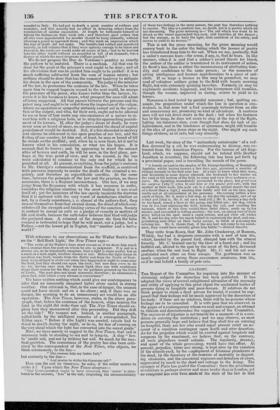With reference to our observations on Sir Walter Scott's lines
on the " Bell Rock Light," the New Times says- " The critic of Sir Walter's lines must excuse us if we deem him much less a seaman than the poet on whom he sits in judgment. It is not in a stormy sea, as he innocently imagines, that a light is alone useful, but as a mark in a dark night, whether stormy or not. Before the light-house in question was built, vessels from the Baltic and from the North of Scot- land, were obliged to strike sail when they happened at night to come near the land, lest they should run upon the rock; but now they scorn to do so: for, having once seen the beacon light, they can with confidence shape their course for the May, and by its guidance proceed up the Frith of Forth. The poet does not speak nonsense, therefore ; he announces a plain fact, with which every seaman is conversant."
We have written nothing which could give our contemporary to infer that we innocently imagined lights alone useful in stormy weather. Our criticism is, that, in the case of danger, the seaman could not have struck sail on a lee-shore ; and, if there was no danger, his scorning to do an unnecessary act would be an idle operation. The New Times, however, states, in the above para- graph, that, before the existence of the beacon, ships nearing the land in the night did strike their sail. The New Times should ex- plain how they manceuvred after this proceeding. Did they drift on the tide ? We suspect not. Indeed, in another paragraph, called forth by the intelligent remarks of a correspondent, the Editor says, " Before it (the Light) was erected, vessels had to stand to sea (!) during the night, or lie-to, for fear of running on the very shoal which the light has converted into the surest guide." Now, we have merely to suggest to the New Times, that sail is necessary both to standing to sea and to lying-to. A ship " lies- to " under sail, and not by striking her sail. So much for the nau- tical question. The correctness of the poetry has also been criti- cised by the correspondent of the New Times, who objects, we think erroneously, to the line- " The seaman bids my lustre hail," but correctly to the line—
And scorns to strike his timorous sail."
How can the sail be timorous, he asks, if the sailor scorns to strike it ? Upon which the New Times observes- " Our Correspondent ought to have observed, that scorn' is attri- buted to the seaman, fear' to the sail; respecting the irreconcilability
of these two feelings in the same person, the poet has therefore nothing to answer. The idea is a poetical one, no doubt, but it is poetry which we are discussing. The prose meaning is—' The sail which was wont to be. struck as the vessel approached this rock, still trembles at the danger ; but the seaman, as he hails the light, feels confident of his safety, and scorns to yield to its terrors.'"
This is not the prose meaning, for the prose meaning would convey back to the sailor the feeling which the licence of poetry has transferred from him to his sail. When we say, poetically, that a sailor's canvass fears—the sense, if any, is, that he fears. In like manner, when it is said that a soldier's sword thirsts for blood, the ardour of the soldier is transferred to its instrument of action. In Scott's line, there is either the inconsistency of attributing timi- dity and confidence to the same person ; or the nonsense of aim°. intelligence and human apprehensions to a piece of sail- cloth. cloth. If so large a licence as this may be permitted, we may read of volunteer soldiers going to the field with hearts scorning flight, but with extremely quaking breeches. Formerly (it may be explained) accidents happened, and the kerseymere still trembles, though the wearer, improved in daring, scorns to yield to its, terrors.
Nonsense is best tested by parallel nonsense ; but, quitting ex- ample, the proposition under which the line in question is con- demned, is, that none but a fool scorningly forbears from an idle and unnecessary act, promising no kind of advantage. A cautious man will not run down stairs in the dark ; but when his footman has lit the lamp, he does not scorn to stop at the top of the flight, halting his timorous shoe, even though that shoe, for lack of en- lightenment, and in the blackness of ignorance, might still tremble at the idea of going down steps in the night. One might say such things of shoes, as of sails, but very absurdly.


















 Previous page
Previous page